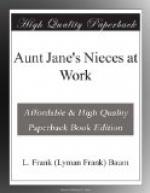“We can’t trace her anywhere, an’ Nell has broke down at las’, an’ don’t do much but cry. It’s hard, sir—I can’t bear to see Nell cry. She’d sich high sperrits, onct.”
“Where’s the boy Tom?” asked Kenneth, somewhat gruffly.
“He’s in the jail yet, waitin’ to be tried. Court don’t set till next week, they say.”
“And where do you live, Rogers?”
“Five miles up the Fairview road. ’Taint much of a place—Nell says I’ve always bin a shif’les lot, an’ I guess it’s true. Yesterday your hired men painted all the front o’ my fence—painted it white—not only where th’ signs was, but th’ whole length of it. We didn’t ask it done, but they jes’ done it. I watched ’em, an’ Nell says if we on’y had th’ money thet was wasted on thet paint an’ labor, we might find our Lucy. ’It’s a shame,’ says Nell, ’all thet ‘lection money bein’ thrown away on paint when it might save our poor crazy child.’ I hope it ain’t wrong, sir; but thet’s what I thought, too. So we laid plans fer me to come here today. Ef I kin get a-hold o’ any o’ thet money honest, I want to do it.”
“Have you got a horse?” asked Kenneth.
“Not now. I owned one las’ year, but he died on me an’ I can’t get another nohow.”
“Did you walk here?” asked Beth.
“Yes, miss; o’ course. I’ve walked the hull county over a-tryin’ to find Lucy. I don’ mind the walking much.”
There was another pause, while old Will Rogers looked anxiously at the boy and the girl, and they looked at each other. Then Beth took out her purse.
“I want to hire your services to help us in the election,” she said, briskly. “I’ll furnish you a horse and buggy and you can drive around and talk with people and try to find Lucy at the same time. This twenty dollars is to help you pay expenses. You needn’t account for it; just help us as much as you can.”
The old man straightened up and his eyes filled again.
“Nell said if it was a matter o’ charity I mustn’t take a cent,” he observed, in a low voice.
’"It isn’t charity. It’s business. And now that we know your story we mean to help you find your girl. Anyone would do that, you know. Tell me, what is Lucy like?”
“She’s like Nell used to be.”
“But we don’t know your wife. Describe Lucy as well as you can. Is she tall?”
“Middlin’, miss.”
“Light or dark?”
“Heh?”
“Is her hair light or dark colored?”
“Middlin’; jes’ middlin’, miss.”
“Well, is she stout or thin?”
“I should say sorter betwixt an’ between, miss.”
“How old is Lucy?”
“Jes’ turned eighteen, miss.”
“Never mind, Beth,” interrupted the boy; “you won’t learn much from old Will’s description. But we’ll see what can be done tomorrow. Call James and have him sent home in the rig he’s going to use. It seems to me you’re disposing rather freely of my horses and carts.”




